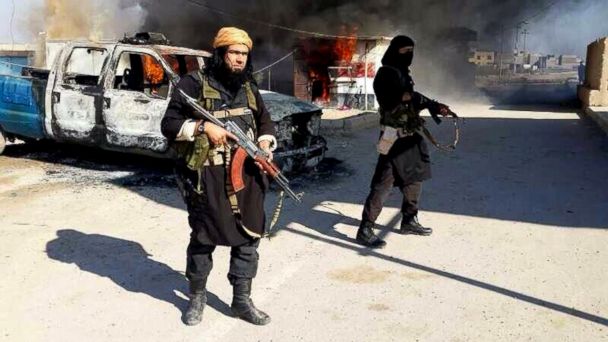ISIS Threat Focus on Syria, But US In No Hurry to Act

(Associated Press)
America's top military officials have acknowledged that ISIS will not be defeated without taking the fight to Syria, but the Pentagon on Friday tamped down any expectation that the U.S. could soon ramp up its help for moderate forces opposing Bashar al-Assad and fighting with ISIS in the country.
DEEP DIVE: ISIS: Trail of Terror
WATCH: Chuck Hagel: ISIS Is an 'Imminent Threat' to US Interests
James Foley's Siblings Say US Could Have Done More to Save Him
James Foley Among Many Young, Close-Knit Freelance War Reporters
"I know of no plans to try to accelerate it," Department of Defense spokesman Rear Admiral John Kirby told reporters, when asked if the Pentagon would speed up $500 million in funding to help moderate Syrian rebels, which it's requested for next year. "Again, we're working through Congress and through the budget-the budget vehicles available to us to get at that program."
On Thursday Secretary of Defense Chuck Hagel and Chairman of the Joint Chiefs of Staff Martin Dempsey said that the administration is looking at all options to be deal with the ISIS threat.
The men did not advocate for airstrikes in Syria, but did not rule them out either. On Friday, Kirby reiterated that the Pentagon continues to review all options.
"The secretary didn't rule anything in or out," Kirby told reporters. "I think he said that options - that all options remain available. And they do."
Dempsey said on Thursday, however, that airstrikes were just "one small part" of a potential overall strategy to defeat the terror group.
"I'm not predicting those will occur in Syria, at least not by the United States of America," said Dempsey. "But it requires the application of all of the tools of national power - diplomatic, economic, information, military."
Both agreed, however, that despite President Bashar al-Assad's hatred of ISIS, the United States and the Assad regime are not on the same side.
"When you have the brutal dictatorship of Assad and what he has done to his own country, which perpetuated much of what is happening and has been happening in Syria - he's part of the problem, and is as much a part of it as probably the central core of it," Hagel said.
"He is absolutely part of the problem," said Dempsey.
The Obama administration has set aside $500 million to help arm and train vetted members of the Syrian opposition, who are now fighting both the Assad regime, and extremist opposition groups such as ISIS and al-Nusrah Front but that program is not set to begin for another year.
Kirby told reporters that there are no plans to speed the assistance and training. He said while the Pentagon does understand the urgency of addressing the extremist problem in Syria, the program is still subject to Congressional approval and needs to be implemented carefully, to make sure only vetted opposition members and groups receive U.S. assistance.
"You can only go as fast as right," he said. "And a key to that is a proper vetting process and we just haven't done that yet."
But the three-year conflict in Syria continues. The United Nations reported on Friday that the number of people killed in Syria's civil war has more than doubled in the past year to at least 191,000.
The UN identifies 191,369 deaths from the start of the conflict in March 2011 to April 2014, more than double the 92,901 deaths cited in their last report, which covered the first two years of the conflict.
UN human rights chief, Navi Pillay blasted the world's inaction on Syria.
"The killers, destroyers and torturers in Syria have been empowered and emboldened by the international paralysis," she said in a statement Friday.